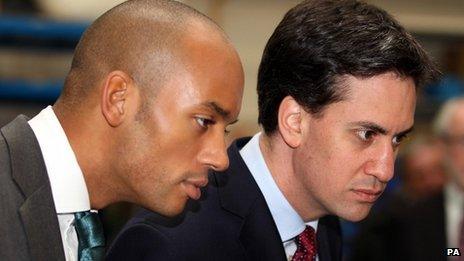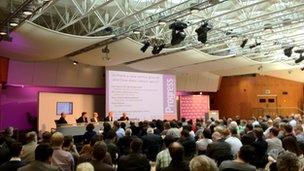Labour modernisers seek the 'new centre ground'
- Published

It is the semi-mythical piece of land sought by all politicians. But does the "centre ground" even exist? Some of Labour's sharpest minds spent their Saturday in search of it. Here's how they got on.
"We are not sure where it is, but we want to win it."
Lord Adonis was only half joking when he summed up the aims of the Labour Party's progressive, modernising wing at its annual conference on Saturday.
The former transport secretary is the new chairman of Progress, a think-tank founded by Lord Mandelson back in the days when "triangulation" - or stealing Conservative policies as critics saw it - was the height of New Labour fashion.
If anyone can find the "centre ground" it should be this lot.
The day started promisingly with Liam Byrne.
The former Cabinet Office minister has written <link> <caption>a pamphlet for Progress on winning the new centre ground</caption> <altText>Progress pamphlet</altText> <url href="http://www.progressonline.org.uk/pamphlets/" platform="highweb"/> </link> .
Far from being a nebulous, slippery location not found on any maps, he believes the centre ground is a solid piece of real estate, a set of values to do with "hard work" and the dignity of labour (with a small L).
His fellow panellists were less certain.
YouGov polling chief Peter Kellner said that even if it did exist, the centre ground was a "philosophically barren" place, that just floated about in the middle of whatever the right and left were saying at any one time.
'Run for the hills'
Philip Collins, a former speech writer for Tony Blair, who now writes a column for The Times, was even more scathing.

Professor Pongoo got more votes than the Lib Dems where he stood in Edinburgh
"I always run for the hills when I see this phrase," he said.
It was ridiculous to suggest that "this group of values that you happen to have, just happen to be perfectly correlated with those of the electorate - despite the fact that they have just not voted for you", he told the conference.
He added, in a none too subtle dig at Byrne, "nobody ever writes a pamphlet saying we have got a new centre ground and it is moving rapidly away from us".
So why go looking for the centre ground at all?
Because, said Kellner, that's how you win elections. Tony Blair erected his big tent there and won three of them in a row. Most British voters describe themselves as left or right of centre, or just "centre".
The usual inhabitants of Progress's central London conference venue, the TUC, were none-too-keen on what they saw as Mr Blair's brand of centrist, managerial politics and some will be hoping Red Ed lives up to his nickname come the next election.
But on Saturday, the Blairites had the floor.
'Ideological vandal'
Liam Byrne - someone who might yet have a say in the next Labour manifesto, now that his ambitions to be the first elected mayor of Birmingham have been dashed - said the party needed to offer an "anti-austerity, pro-growth" alternative to the Conservatives.
Philip Collins said Labour had to own up to its past mistakes on the economy, particularly Gordon Brown's "hubristic" claim to have ended boom and bust. That got a big cheer from the Progress crowd.
He also advised the party to stop trying to portray David Cameron as an "ideological vandal doing bad things on purpose" when "the truth is the opposite, he hasn't got a clue what he is doing".
"That diminishing reputation for competence is absolutely toxic for Cameron," added Mr Collins.
Peter Kellner said Labour needed to be "soothing rather than scaring people". If they had to offer change at all at the next election, it should be "soothing change", he advised.
Others argued Miliband should go for broke and that voters were fed up with triangulating politicians who only said what they thought voters wanted to hear.
'Professor Pongoo'
The fear among this faction is that even if Labour succeeds in finding its way to the new centre ground, it will already be occupied. Not by the Conservatives necessarily, or even the Lib Dems, but by a man dressed in a penguin suit. Or worse (for them), George Galloway.
Charismatic mavericks of the left, such as Galloway, or the right, such as Marine Le Pen in France, were colonising the new centre ground across Europe, argued The Daily Telegraph's Mary Riddell, as voters turned their back on the old mainstream parties.

Progress debated the future direction of the Labour Party
Even candidates such as penguin-suited Mike 'Professor Pongoo' Ferrigan were getting more votes than established parties.
(There was much sniggering on Saturday at the expense of the Lib Dem candidate beaten by Professor Pongoo in Edinburgh's local elections... but also a sense that it could have happened to anyone in the current climate.)
Ed Miliband is fully on board with those that worry party politics is dying. In his keynote speech, he warned it was in danger of becoming a minority pursuit.
He urged Labour Party members to reach out to the two-thirds of the electorate who did not vote in this month's local elections, setting them the task of restoring turnout to 1997 levels.
He knows that Labour always do badly at general elections when there is a low turnout, which is why he is so keen to ensure that the party's supporters do not disappear off the register when the move towards individual voter registration begins.
But even while he was speaking some were questioning the wisdom of his strategy. Elections expert Professor Philip Cowley <link> <caption>tweeted</caption> <url href="http://twitter.com/#!/philipjcowley" platform="highweb"/> </link> that "You may as well base your strategy on raising the dead as focusing on non-voters".
In the end, of course, it will be the policies that matter, and we must wait until the autumn, and the outcome of Labour's exhaustive two-year review, to find out what they are.
But whether he opts to be bold and radical, or safe and pedestrian, one thing is certain, in keeping with every other party leader, Mr Miliband will claim to be sitting squarely in the centre ground.
He can only hope the voters have found their way there too.